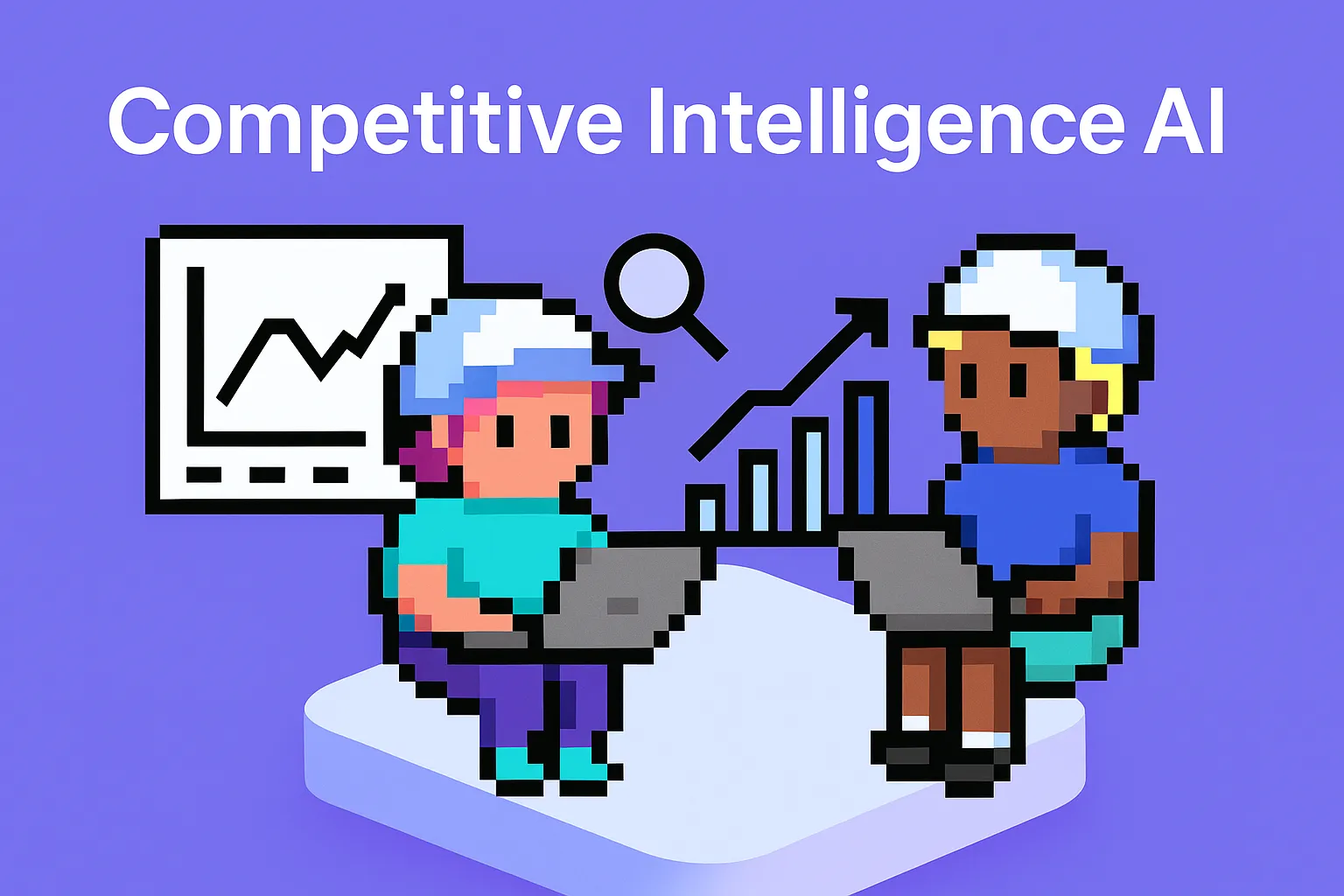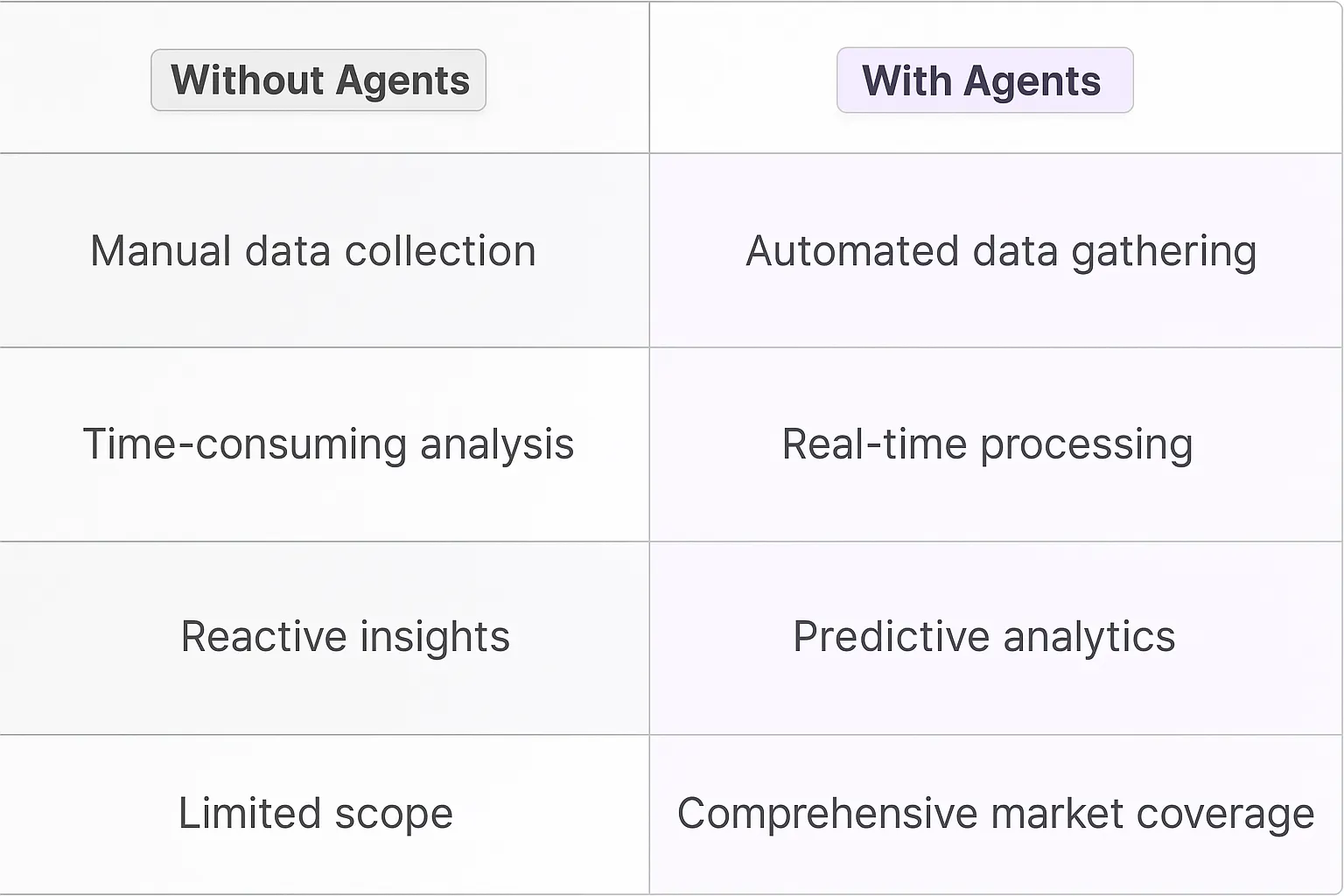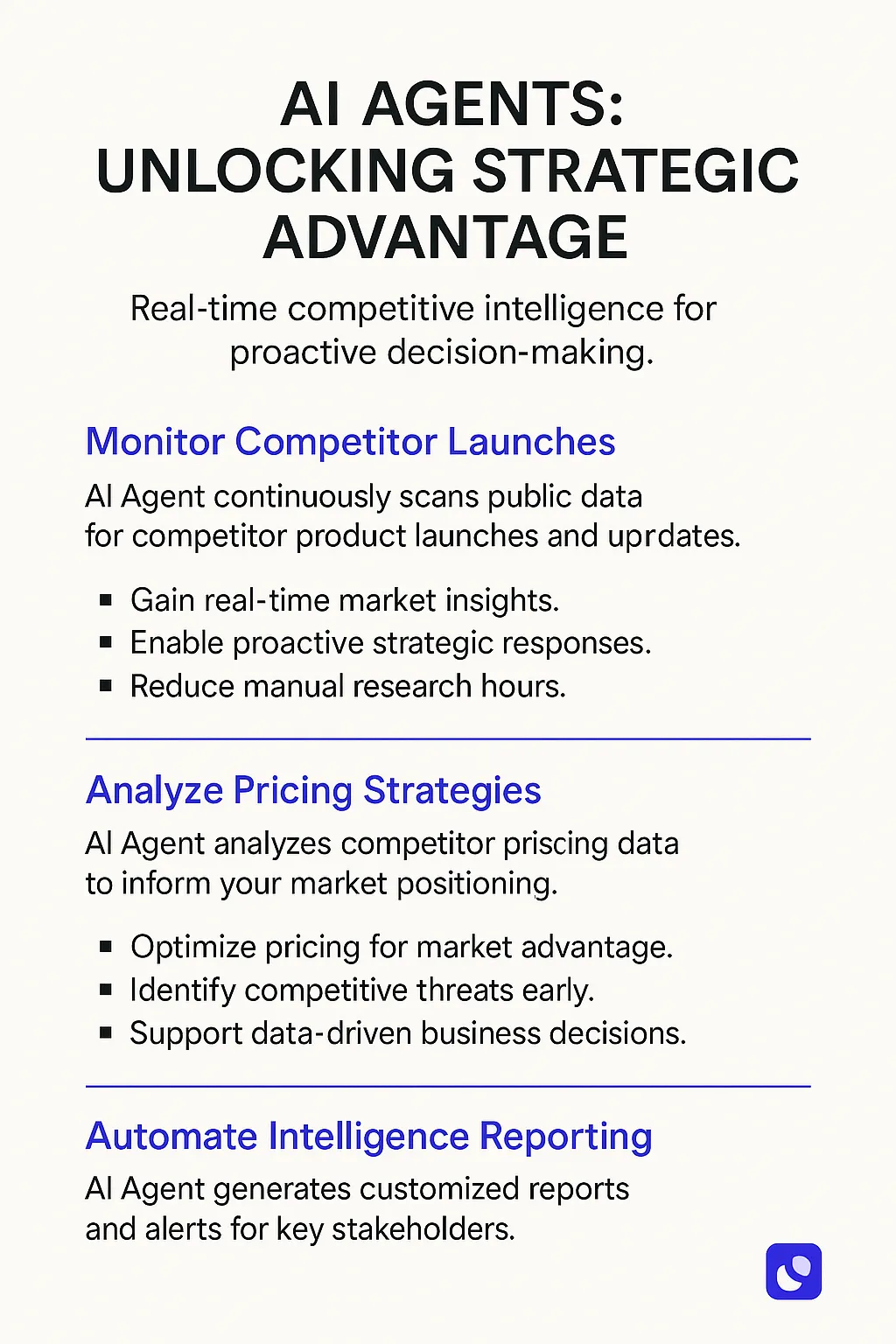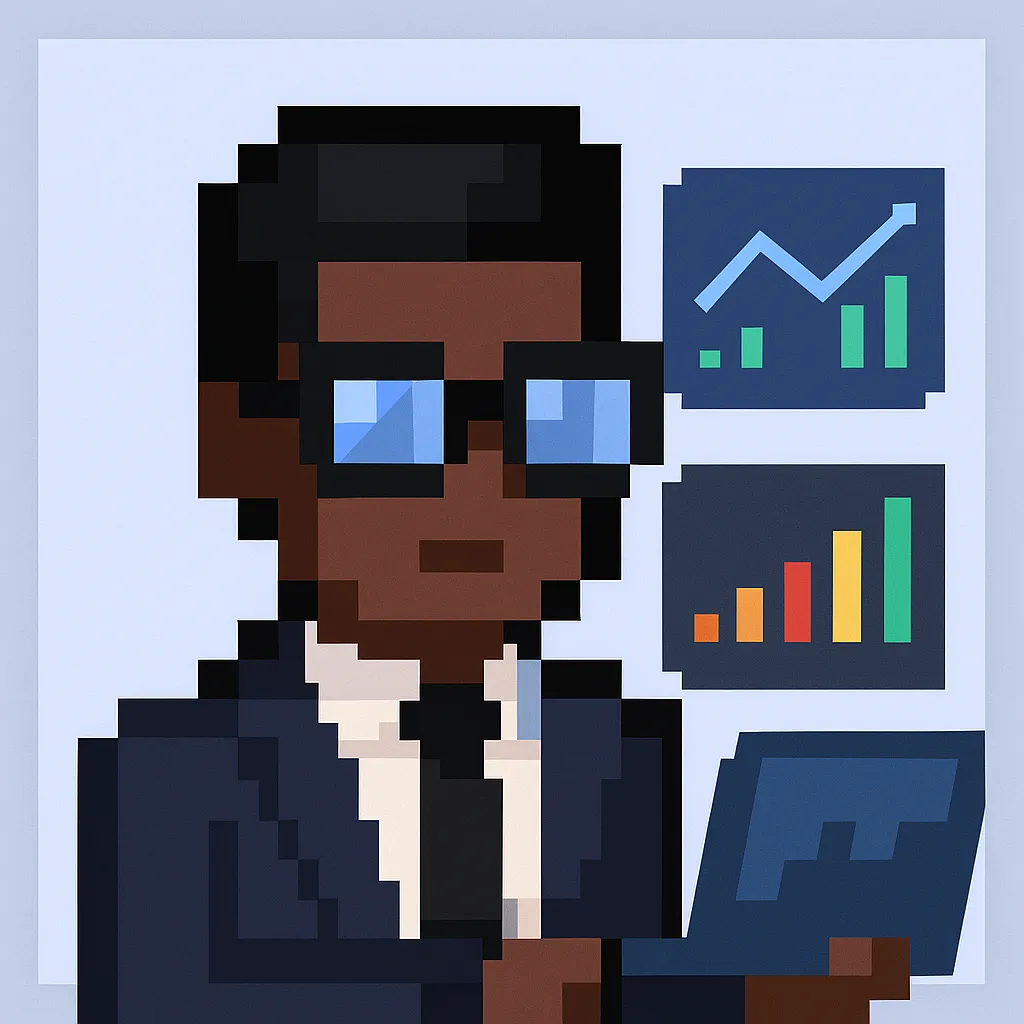Competitive Intelligence AI Agents
Understanding Competitive Intelligence in the AI Era
What is Competitive Intelligence?
Competitive Intelligence (CI) is the systematic process of gathering, analyzing, and acting on information about competitors, customers, and the overall business environment. It's not just about collecting data; it's about transforming that data into actionable insights that drive strategic decision-making. In the digital age, CI has become a critical function for businesses looking to maintain their edge in increasingly competitive markets.
Key Features of Competitive Intelligence
- Real-time Monitoring: CI tools continuously scan various sources for up-to-the-minute information on competitors and market trends.
- Data Analysis: Advanced algorithms process and interpret large volumes of data analysis to identify patterns and insights.
- Predictive Analytics: CI systems use historical data and current trends to forecast future market movements and competitor actions through predictive analytics.
- Customized Reporting: Insights are tailored to specific roles and departments within an organization, ensuring relevance and actionability.
- Integration Capabilities: CI tools often integrate with existing business systems, creating a seamless flow of information across the organization.

Benefits of AI Agents for Competitive Intelligence
What would have been used before AI Agents?
Before AI agents entered the scene, competitive intelligence was a manual grind. Teams would spend countless hours scouring the web, setting up Google Alerts, and poring over industry reports. It was like trying to drink from a firehose of information, hoping to catch the important drops.
Companies often relied on expensive market research firms or dedicated CI teams. These approaches were not only costly but also suffered from significant time lags. By the time insights were compiled and presented, they were often outdated in our fast-moving tech landscape.
What are the benefits of AI Agents?
AI agents are transforming competitive intelligence from a reactive, labor-intensive process into a proactive, real-time strategic advantage. Here's why they're game-changers:
- 24/7 Market Monitoring: AI agents never sleep. They continuously scan vast amounts of data sources, from news articles to social media chatter, catching even the subtlest market shifts or competitor moves.
- Pattern Recognition at Scale: These digital teammates excel at identifying trends and patterns that human analysts might miss. They can connect dots across disparate data points, unveiling hidden market opportunities or potential threats.
- Predictive Insights: By analyzing historical data and current market dynamics, AI agents can forecast potential competitor actions or industry trends, allowing companies to stay ahead of the curve.
- Personalized Intelligence: AI agents can tailor their outputs to specific roles or departments within an organization. A product manager and a sales rep can receive different, relevant competitive insights without additional manual filtering.
- Rapid Response Capability: In the fast-paced tech world, timing is everything. AI agents can alert teams to critical competitor actions or market changes in real-time, enabling swift strategic responses.
- Bias Reduction: Human analysts can fall prey to confirmation bias or other cognitive pitfalls. AI agents, when properly designed, can provide more objective analysis of competitive landscapes.
The real power of AI agents in competitive intelligence lies in their ability to augment human strategic thinking. They handle the heavy lifting of data collection and initial analysis, freeing up human experts to focus on high-level strategy and decision-making. This human-AI collaboration creates a flywheel effect, continuously improving the quality and relevance of competitive insights.
As these AI agents evolve, we're moving towards a future where every company, regardless of size, can have access to enterprise-grade competitive intelligence. This democratization of strategic insights could level the playing field in many industries, potentially leading to more innovation and competition - a rising tide that lifts all boats in the tech ecosystem.

Potential Use Cases of AI Agents for Competitive Intelligence
Processes
Competitive intelligence is a game-changer, and AI agents are taking it to the next level. These digital teammates are transforming how businesses gather, analyze, and act on market data. Let's dive into some killer use cases that'll make you rethink your CI strategy.
First up, continuous market monitoring. AI agents can tirelessly scan the web, social media, and news outlets 24/7, picking up on subtle shifts in competitor behavior, emerging trends, and potential disruptors. They're like having a team of analysts working round the clock, but without the need for coffee breaks or sleep.
Next, sentiment analysis at scale. These AI-powered tools can process vast amounts of customer feedback, reviews, and social media chatter about your competitors. They'll give you a real-time pulse on how the market perceives your rivals, helping you spot opportunities and threats before they become obvious.
Predictive modeling is another game-changing process. AI agents can crunch historical data and current market signals to forecast competitor moves. It's like having a crystal ball, but one based on hard data and machine learning algorithms rather than mystical hocus-pocus.
Tasks
Now, let's break it down into specific tasks where AI agents shine in competitive intelligence:
1. Competitor product launch tracking: AI agents can monitor patent filings, job postings, and social media buzz to give you early warnings about upcoming product launches from your rivals.
2. Pricing strategy analysis: These digital teammates can scrape and analyze competitor pricing data across various channels, helping you optimize your own pricing strategy in real-time.
3. Content gap analysis: AI agents can compare your content strategy against competitors, identifying topics and formats where you're falling behind or where there's an opportunity to lead.
4. Regulatory compliance monitoring: In industries with complex regulatory landscapes, AI agents can keep tabs on how competitors are navigating new rules and requirements, giving you insights to inform your own compliance strategy.
5. Talent movement tracking: By analyzing LinkedIn and other professional networks, AI agents can alert you to key personnel changes at competitor organizations, potentially signaling strategic shifts.
6. Financial performance analysis: For public companies, AI agents can parse earnings reports and analyst calls, extracting key insights about competitor financial health and strategic direction.
7. Brand perception comparison: Using natural language processing, AI agents can analyze how your brand is perceived compared to competitors across various online platforms.
The beauty of these AI-powered competitive intelligence processes and tasks is that they're not just faster – they're smarter. They can spot patterns and connections that human analysts might miss, giving you a serious edge in understanding and outmaneuvering your competition.
But here's the kicker: the real power comes when you combine these AI capabilities with human strategic thinking. It's not about replacing your CI team, but supercharging them with AI-driven insights. This human-AI collaboration is where the magic happens, turning raw data into actionable strategies that can reshape your market position.
As we move into this AI-enhanced competitive intelligence landscape, the companies that thrive will be those that effectively blend machine intelligence with human creativity and intuition. It's a brave new world of CI, and AI agents are your ticket to staying ahead of the curve.

Industry Use Cases for Competitive Intelligence AI Agents
The versatility of AI agents in competitive intelligence makes them valuable across various industries. Let's dive into some meaty, industry-specific use cases that showcase how AI can transform workflows and processes. These aren't your run-of-the-mill examples; we're talking about AI that's so integrated, it's like having a team of expert analysts working 24/7, but without the coffee breaks.
From tech startups to Fortune 500 giants, companies are leveraging these digital teammates to gain that crucial edge. They're not just gathering data; they're connecting dots that humans might miss, predicting market shifts before they happen, and serving up data-driven insights that can make or break strategic decisions. It's like having a crystal ball, but one that's powered by algorithms and machine learning instead of mystical energy.
So, buckle up. We're about to explore how different sectors are putting competitive intelligence AI to work, creating moats that are not just wide, but filled with data-driven insights that keep the competition guessing. This isn't about incremental improvements; it's about redefining how businesses understand and react to their competitive landscape.
Competitive Intelligence AI in the Automotive Industry: Driving Innovation at Warp Speed
The automotive industry is a battleground of innovation, where staying ahead means predicting your competitors' next moves before they make them. Enter Competitive Intelligence AI agents – the secret weapon that's about to turn the industry on its head.
Take Tesla, for example. They've been dominating the electric vehicle (EV) market, but traditional automakers are catching up. A Competitive Intelligence AI agent could be a game-changer for a company like Ford or GM. Here's how:
The AI agent would constantly scan and analyze vast amounts of data – patent filings, social media chatter, supplier relationships, and even satellite imagery of manufacturing plants. It would piece together these disparate data points to form a coherent picture of Tesla's strategy and upcoming product launches.
But it doesn't stop there. The AI agent could also predict how Tesla might respond to new market entrants or changes in government regulations. It could even suggest potential weak points in Tesla's supply chain or identify emerging technologies that could disrupt Tesla's current advantage.
The real magic happens when this intelligence is combined with the automaker's own R&D efforts. Suddenly, they're not just reacting to Tesla's moves – they're anticipating them, and potentially leapfrogging them.
This isn't just about keeping up with the Musks. It's about fundamentally changing how companies compete. With Competitive Intelligence AI agents, the automotive industry could see a rapid acceleration in innovation cycles. We might see new vehicle concepts going from idea to market in half the time it takes now.
The implications are massive. Faster innovation cycles mean more consumer choice, potentially lower prices, and a quicker transition to sustainable transportation. It's not just about building a better car – it's about reshaping the future of mobility itself.
In the high-stakes game of automotive innovation, Competitive Intelligence AI agents aren't just changing the rules – they're rewriting the entire playbook. Buckle up, because the race to the future of transportation just shifted into overdrive.
Competitive Intelligence AI in the Fashion Industry: Predicting Trends Before They Hit the Runway
The fashion industry moves at breakneck speed, with trends emerging and fading faster than you can say "last season's look." But what if you could predict the next big thing before it even hits the runway? That's where Competitive Intelligence AI agents come in, and they're about to turn the fashion world upside down.
Let's take a look at how a major fast-fashion retailer like Zara could leverage this technology to stay ahead of the curve:
A Competitive Intelligence AI agent for Zara would be like having a digital crystal ball. It would constantly analyze a vast array of data sources - social media posts, fashion blogs, street style photos, celebrity outfits, and even art exhibitions. But here's where it gets interesting: the AI wouldn't just look at what's trending now, it would predict what's going to trend next.
By analyzing patterns in color preferences, silhouettes, and materials across different markets and demographics, the AI could forecast emerging trends months before they hit the mainstream. It could even predict how long a trend is likely to last, helping Zara optimize its production cycles.
But it doesn't stop at trend prediction. The AI agent could also keep tabs on competitors' supply chains, pricing strategies, and marketing campaigns. It could identify potential collaborations or acquisition targets that align with predicted trends. Imagine knowing which up-and-coming designer is about to blow up, or which sustainable fabric is going to be the next big thing in eco-fashion.
The real power comes when this intelligence is integrated with Zara's already impressive quick-response manufacturing system. They could start designing and producing clothes for trends that don't even exist yet, essentially creating the future of fashion rather than just responding to it.
This isn't just about staying competitive - it's about redefining what competition means in the fashion industry. With Competitive Intelligence AI agents, we could see a shift from reactive trend-chasing to proactive trend-setting. The fashion cycle could become even faster, more personalized, and potentially more sustainable as production becomes more precisely aligned with demand.
The implications are huge. We could see a democratization of trend-setting, with AI-powered brands able to cater to niche style preferences that were previously too small to be profitable. It could lead to more diversity in fashion, as AI agents identify and amplify emerging styles from various cultures and subcultures.
In the high-stakes world of fast fashion, Competitive Intelligence AI agents aren't just predicting the future - they're designing it. Get ready, because the next big trend you see might have been dreamed up by an AI before any human even thought of it.
Considerations
Technical Challenges
Building a competitive intelligence AI agent isn't just about slapping some machine learning models together and calling it a day. It's a complex beast that requires serious technical chops and a deep understanding of the competitive landscape.
First off, data quality is a massive hurdle. Your AI agent is only as good as the data it's fed, and in the world of competitive intelligence, that data is often messy, incomplete, or just plain wrong. You're dealing with a mix of structured and unstructured data from various sources - social media, news articles, financial reports, and even the dark corners of the internet where competitors might be hiding their secrets.
Then there's the challenge of real-time processing. Markets move fast, and your AI needs to keep up. This isn't just about throwing more compute at the problem; it's about designing intelligent algorithms that can prioritize and process information efficiently, separating the signal from the noise in a sea of data.
Natural language processing is another technical minefield. Your AI needs to understand context, sentiment, and even read between the lines. It's not just about keyword matching; it's about grasping the nuances of human communication across different languages and cultures.
Operational Challenges
On the operational side, things get even trickier. You're essentially creating a digital spy, and with great power comes great responsibility (and a whole lot of headaches).
Privacy and legal concerns are at the top of the list. You need to ensure your AI agent isn't crossing any ethical or legal boundaries in its quest for competitive intelligence. This means implementing robust safeguards and constantly updating your policies as regulations evolve.
Integration with existing systems is another operational nightmare. Your shiny new AI agent needs to play nice with your current tech stack, from CRMs to business intelligence tools. It's not just about API connections; it's about creating a seamless workflow that actually enhances productivity rather than becoming another tool that nobody uses.
Then there's the human factor. Your AI agent isn't replacing human analysts; it's augmenting them. But this requires a significant shift in how people work. You need to train your team not just on how to use the AI, but how to interpret its outputs, challenge its assumptions, and provide the human insight that no machine can replicate.
Lastly, there's the ever-present challenge of ROI. Competitive intelligence is notoriously hard to quantify in terms of direct business impact. You need to develop robust metrics and KPIs that can justify the significant investment in developing and maintaining an AI agent for competitive intelligence.
In the end, implementing a competitive intelligence AI agent is a high-risk, high-reward endeavor. It's not for the faint of heart, but for those who can navigate these challenges, the potential for gaining a true competitive edge is enormous.
Embracing AI for Strategic Competitive Advantage
Competitive Intelligence AI agents are more than just a tool; they're a paradigm shift in how businesses understand and react to their competitive landscape. By combining the tireless data-gathering capabilities of AI with human strategic thinking, companies can create a powerful synergy that drives innovation and growth.
As these AI agents continue to evolve, we're likely to see even more sophisticated applications across various industries. From predicting market trends in fashion to optimizing supply chains in manufacturing, the potential use cases are vast and varied.
However, it's crucial to remember that implementing these AI agents comes with its own set of challenges. From ensuring data quality to navigating privacy concerns, businesses need to approach this technology thoughtfully and strategically.
Ultimately, the companies that successfully harness the power of Competitive Intelligence AI agents will be the ones that thrive in the increasingly complex and fast-paced business world of tomorrow. It's not just about staying ahead of the competition; it's about redefining what competition means in the age of AI.













